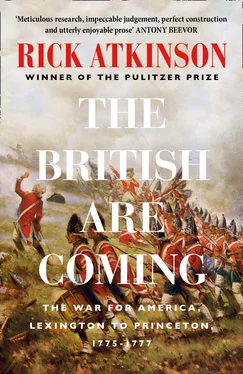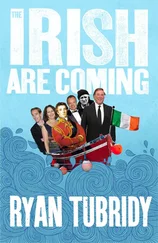The king’s heart hardened. Spurning petitions and appeals from those pleading for moderation, he vowed in March 1774 to “stop the present disorders.” To Parliament he denounced “a dangerous spirit of resistance” in America among “my deluded subjects,” who, according to a new legal opinion by the British attorney general, were committing “the crime of high treason.” The troubles in Boston threatened “anarchy, the most terrible of all evils.”
George’s resolve helped his ministers rally around three critical assumptions, each of which proved false: that most colonists remained loyal to the Crown, notwithstanding troublemakers in Massachusetts capable of inciting a rabble; that firmness, including military firepower if necessary, would intimidate the obstreperous and restore harmony; and that failure to reassert London’s authority would eventually unstitch the empire, causing Britain to “revert to her primitive insignificancy in the map of the world,” as a member of the House of Commons warned.
Here, then, was the crux. The king and his men believed that British wealth and status derived from the colonies. The erosion of authority in America, followed by a loss of sovereignty, would encourage rebellions in Canada, Ireland, the Caribbean, India. Dominoes would topple. “Destruction must follow disunion,” the colonial secretary, Lord Dartmouth, warned. With the empire dismembered, an impoverished Great Britain, no longer great, would invite “the scorn of Europe” and exploitation by enemies in France, Spain, and elsewhere. Those windrows of wet tea leaves foretold political and economic ruin.
From late March through June 1774, Parliament adopted four laws known collectively in Britain as the Coercive Acts (and later in America as the Intolerable Acts). The first was punitive: Boston’s port must close until the cost of the ruined tea was paid to the East India Company. The other laws tightened British control over Massachusetts by converting an elected council into one appointed by the governor, by restricting town meetings and jury selection, and by permitting royal officials accused of serious crimes to be tried in England or another colony. British troops would return to Boston under a commander in chief who would also serve as the royal governor.
With exquisitely bad timing, in June Parliament passed another sweeping law, one that colonists assumed was part of the tea party retaliation but that in fact had taken years to craft. The Quebec Act replaced military rule in newly acquired Canada with an autocratic civilian government, while legitimizing the Catholic Church’s authority and vastly extending the provincial boundaries west and south, to the rich territory between the Mississippi and Ohio Rivers. The empowerment of popery enraged Protestant New Englanders, who for more than a century had battled French Catholics and their Indian allies; colonists from New York through the Carolinas, keen to expand west of the Appalachians, were likewise infuriated at being confined to the Atlantic seaboard.
“The die is now cast,” George wrote. “The colonies must either submit or triumph. We must not retreat.”
The die was indeed cast. Despite London’s hope of isolating Boston as a pariah, indignation and resentment swept the colonies. The Coercive Acts and the Quebec Act galvanized American resistance, empowering the radicals and further converting neutrals and moderates to a cause now touched with fire. Rather than shun those who staged the tea party, towns in New England and as far south as Charleston sent food, firewood, and money to sustain Boston when the port closed in June.
In September, fifty-five delegates from a dozen colonies—Georgia remained ambivalent—gathered in Philadelphia, emboldened enough to call themselves the Continental Congress. Not only did they endorse resistance to the Coercive Acts, the delegates also agreed to halt trade with the British Empire over the coming months. Imports and exports would be forbidden in an escalating economic campaign intended to pressure London by hurting British merchants, manufacturers, and consumers. Elected committees of safety and inspection “in every county, city, and town” were to enforce this agreement on retaliatory trade restrictions, known as the Association. Civic virtue would be measured by a colonist’s refusal to consume British goods or trade with the mother country; transgressors were to be publicly shamed, or worse. The Association committees—revolutionary and robust—drew an estimated seven thousand Americans into political office for the first time. At the same time, American militia leaders had begun stockpiling gunpowder and other munitions.
“A most daring spirit of resistance and disobedience” had infected the colonies, George told Parliament that November, with “fresh violences of a very criminal nature.” As captain general and first soldier of the empire, the king would do what was necessary to compel obedience from over two million recalcitrant subjects, even if they lived three thousand miles away in a country six times larger than England. What he would call his “great lenity” toward the Americans had been a mistake; he would not make it again. “I am not sorry that the line of conduct seems now chalked out,” he wrote his chief minister, Lord North, in a note dated “48 minutes past midnight” on November 18. “Blows must decide.”
London on the march toward war was much like London at peace—aggressive, vivid, and alive with animal spirits. Cockfights and bearbaiting remained popular, especially on Mondays and Tuesdays. Raucous crowds assembled on January 10, 1775, to see six criminals—four burglars and two thieves—trundled in carts down Oxford Street to the Tyburn gallows. Another eight were condemned to death that week in an Old Bailey courtroom, among them a defendant who stole sixpence from a farm boy. The British penal code listed nearly two hundred capital crimes, including such heinous offenses as demolishing fishponds and wandering at night with one’s face blackened, not unlike the tea party hooligans in Boston. Tyburn’s hangman would rarely be idle.
The largest city in the Western world now held three-quarters of a million souls, and what a din they made: the bawl of balladmongers, knife grinders, itinerant musicians, and pleading beggars, some with rented babies on their hips; the clop and clatter of hooves and iron-wheeled carts on paving stones; the tinkling bells of scavenger drays; the cries of Thames ferrymen and higglers selling flowers, or apples, or jellied eels, or quack potions. Watchmen known as Charlies—the office dated to Charles II’s reign—called out the hour when clocks struck, proclaiming good weather or bad. With noise came the stink of sea coal and wood smoke and thick effusions from smithies, dyers’ yards, and earthenware kilns. Pigs, chickens, and cows lived in cellars with their owners, and streets served as open sewers for tripe dressers, sausage makers, and the offal of catgut spinners.
The city had 42 markets and countless public houses, including, by one later tally, 55 Swans, 90 King’s Heads, 120 Lions, but only 1 Good Man; the author Tobias Smollett claimed a man could get drunk for a penny and dead drunk for tuppence. Among the estimated ten thousand prostitutes, streetwalkers worked the Strand or the alleys near Covent Garden, where higher-priced courtesans preened in bay windows on the piazza and men paid to be flogged by women known as “posture molls.” Freaks and frauds peopled the metropolis: a certain Mary Tofts who supposedly gave birth to rabbits, an armless man who shaved with his foot, a Scot who broke glasses with a mighty shout, and shopkeepers who sold donkey as mutton and white bread kneaded with chalk or bone ash. But mostly it was a city that toiled hard: clerks and barbers, merchants and printers, coal heavers and coppersmiths with their beards stained green. If not already the world’s greatest metropolis, London was working to earn that laurel.
Читать дальше












